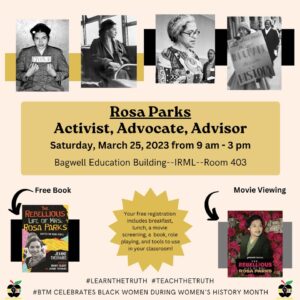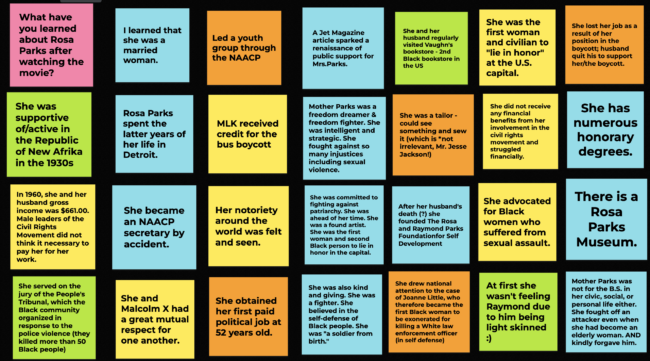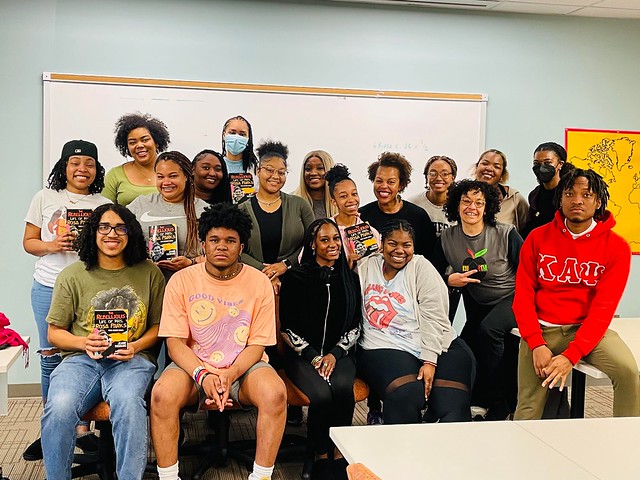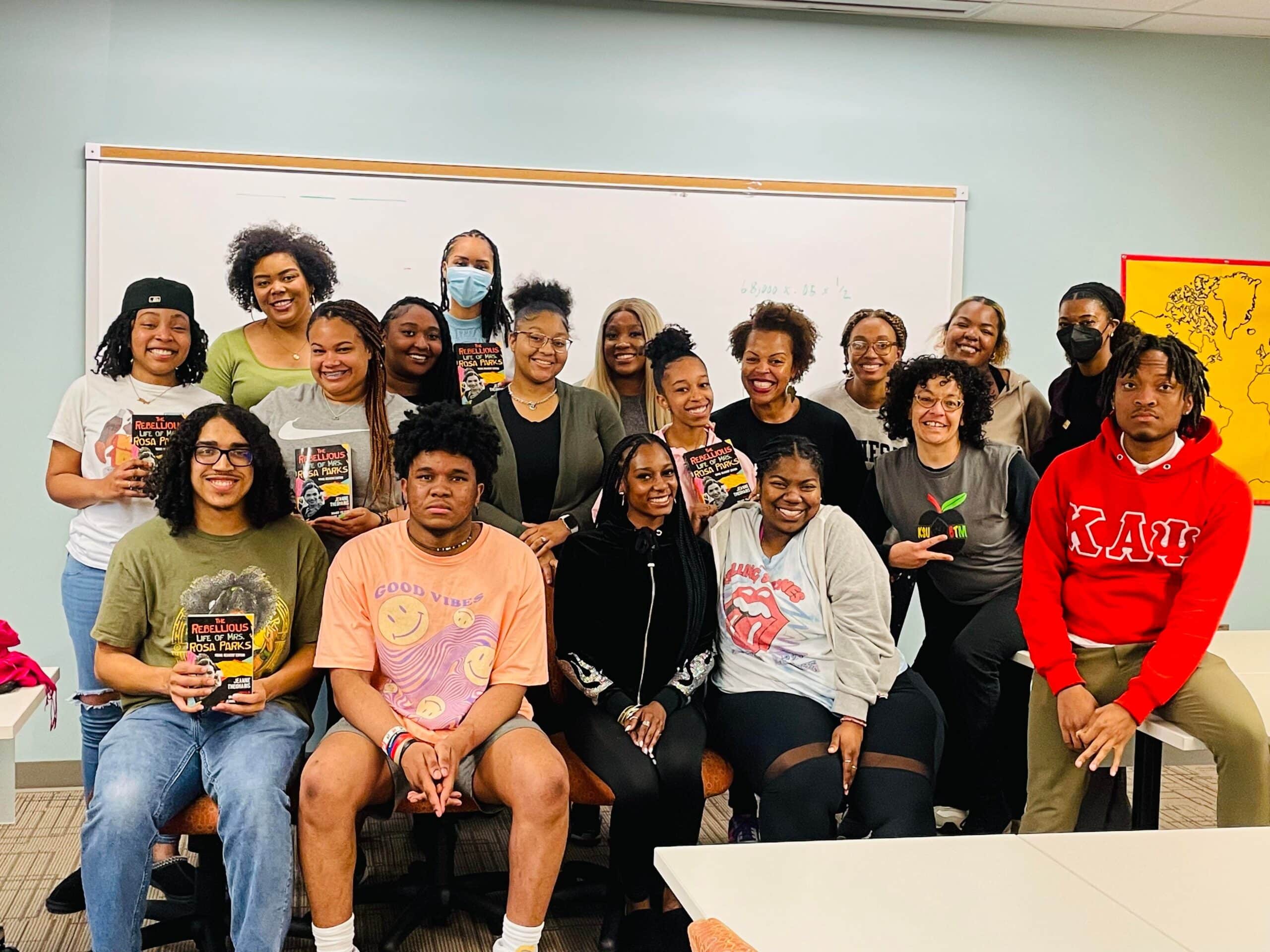In March 2023, Georgia’s Kennesaw State University Teaching for Black Lives study group and #BlackTeachersMatter hosted a “Rosa Parks: Activist, Advocate, Advisor” two-day event for undergraduate students and alumni. The study group members are from the Bagwell College of Education and the coordinator is Marrielle Myers, Director of Diversity, Equity, and Advocacy.
 The program included a film screening of The Rebellious Life of Mrs. Rosa Parks and curriculum workshops using lessons from the Zinn Education Project’s teaching guide. Participants received breakfast, lunch, and a copy of the young reader’s edition of The Rebellious Life of Mrs. Rosa Parks.
The program included a film screening of The Rebellious Life of Mrs. Rosa Parks and curriculum workshops using lessons from the Zinn Education Project’s teaching guide. Participants received breakfast, lunch, and a copy of the young reader’s edition of The Rebellious Life of Mrs. Rosa Parks.
Documentary Film
The first day was held as a retreat and opened with an affirmation to ground the space.
Then participants responded on a Jamboard with pre- and post- documentary film screening prompts:
- What do you know about Rosa Parks now?
- What have you learned about Rosa Parks after watching the movie?
- What questions do you have after watching the movie?

Lessons and Readings
During lunch, Myers facilitated a session titled “Teaching the Truth During Tough Times: Policies, Politics, Passion, and Promise.”
Dr. Lateefah Id-Deen, a Mathematics professor, led the “Problematic Timeline” activity, adapted from Ursula Wolfe-Rocca’s “Why Is This Timeline So Boring and Short?” lesson. This activity begins with participants reviewing the Library of Congress’s Timeline covering the life of Rosa Parks, 1913–2005, which has only about 20 entries. Id-Deen prompted participants to think about what they noticed about the timeline and discussed how the framing of the timeline positioned Rosa Parks as passive, rather than highlighting her intentional choice not to move.
Dr. Kristie Smith, an ELA professor, facilitated an activity adapted from Jesse Hagopian’s “Rosa Parks: Countering the Master Narrative” lesson. Afterwards, each participant was invited to think about what they wanted their life story to be and what the soundtrack to a movie about us would be.
For the second day, the planning group organized a jigsaw reading activity. Myers said:
We find it important to connect our teachers with lesson plans and other resources the Zinn Education Project offers, along with the political knowledge they need to know how to navigate barriers to teaching the truth.
Teaching in Truth in These Times
After watching the movie and focusing exclusively on what we learned about Rosa Parks, we wanted the second day to expand that initial presentation. Therefore, we included recent articles about the bans on AP African American history and the Florida textbook publisher deleting Rosa Parks’ race from materials. We also wanted to create space for our students to learn and reflect more broadly about political attacks on education and the “Divisive Concepts” House Bill 1084 that was passed into law in Georgia in July 2022.
These are the articles that participants engaged with:
Participants read one of the three articles and discussed with others that read the same article. Groups responded to the prompts:
- What were you already familiar with in this article?
- What was new for you in the article?
- Were there any concepts, phrases, or ideas that were confusing?
- How do you feel about what you read?
- What are you wondering now that you’ve read your article?
Then, in groups of three, where each member had read one of the articles, participants shared a 2–3 minute summary of each reading and responded to the questions:
- How does what you’re reading align (or conflict with) your desire to become an educator?
- What tools or skills do you think you already have to navigate the current teaching climate?
- What tools or skills do you think you need to navigate the current teaching climate?
- Why are these readings especially important for Black teachers?
One participant commented,
These types of experiences should not be optional. They should be required for all teacher education students.
The evening session concluded by reflecting on the quote by Audre Lorde, “Revolution is not a one-time event.”
In reflection Myers said:
The conversation between the two events was riveting. The pre-service and in-service teachers were filled with a range of emotions, thoughts, and wonderings — powerful responses that ranged from fear to anger, to rage, and to feeling more motivated to make a change. I was intentional about asking them how they felt, as emotions are not often welcomed in traditional teacher education classes, but it is critical that we welcome and honor them in the space we cultivated.
This was a powerful series of events that I hope we can offer again next year. We all came away with a shared appreciation for the imperative to teach the truth and why our work is more important now than ever before. We will continue our work through the summer.
More Photos


